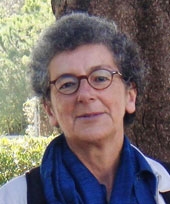Mariana Valverde is a professor at the Centre for Criminology and Sociolegal Studies at the University of Toronto, and a Fellow of the Royal Society of Canada since 2006. She served as Director of the Centre from 2007 to 2013 and was one of the founders of the Sexual Diversity Studies program. She holds a courtesy cross-appointment to the Department of Geography and Planning as well as the Faculty of Law. Prior to joining the University of Toronto in 1993, she was an associate professor in the Department of Sociology at York University and previously taught in Women’s Studies at Trent University.
In 2016, Professor Valverde received the Law and Society Association’s Harry J. Kalven Jr. Award in recognition of “empirical scholarship that has contributed most effectively to the advancement of research in law and society.” She has twice won the Association’s Herbert Jacobs Book Prize for a major contribution to socio-legal scholarship: in 2000 for Diseases of the Will: Alcohol and the Dilemmas of Freedom (Cambridge University Press, 1998) and again in 2013 for Everyday Law on the Streets: City Governance in an Age of Diversity (University of Chicago Press, 2012). Professor Valverde is also the author of Chronotopes of Law: Jurisdiction, Scale and Governance; The Force of Law; The Age of Light, Soap, and Water: Moral Reform in English Canada 1880s-1920s (now in its second edition); Law and Order: Signs, Meanings, Myths; Law’s Dream of a Common Knowledge; and Sex, Power and Pleasure. Her most recent book Michel Foucault (Routledge, 2017) is the first title in a series on key thinkers in criminology, and gives an accessible account of Foucault’s work and how it can be used for purposes of legal studies and criminological research. Her co-edited collections include Police and the Liberal State (Stanford University Press, 2008) and The New Police Science: The Police Power in Domestic and International Governance (Stanford University Press, 2006) (both with Markus Dubber), and Wife Assault and the Canadian Criminal Justice System: Issues and Policies (Centre of Criminology, 1995) (with Linda Macleod and Kirsten Johnson).
Professor Valverde’s main research interests are currently urban law and governance (historically and in the present) and, at the theoretical level, Foucault, sexuality studies, theories of spatiotemporality, and actor-network theory. In addition, her SSHRC-funded research project, “Planning by Contract?” (2013-2016), illuminates how legal tools from private law, such as contracts, as well as the governance structures developed for and by public-private partnerships, are changing local and municipal governance. This project is being conducted with urban political scientist Professor Aaron Moore, planning scholar Professor Sue Bunce and transnational financing expert Professor Fleur Johns.

